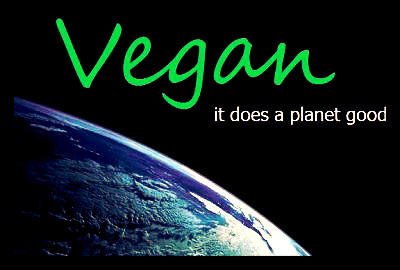Transitioning from Vegetarian to Vegan…
26 January 2016Most vegans agree, it's more important (and easier) to change your diet one step at a time; if you are currently a vegetarian you probably have already realized that. First you went vegetarian and stayed with that for a while. Plus you learned how to make it work for you, including smart shopping, cooking, eating out, dealing with awkward social situations, etc.
Now, you can do almost exactly the same thing, it’s still a gradual transition, but it just takes it another step further. Going vegan from vegetarian is actually quite easy.
But let’s make sure we're on the same page. "Vegetarian" means you had to say goodbye to any foods for which an animal had to actually give up its life, which meant meats of all kinds (yes, including chicken and fish) and any foods which contain products or byproducts of these animals (a few examples include some soup broths, pasta sauces, lard and fish oil).
As a "vegan" you will necessarily need to give up all the other animal products, even those which the animals did NOT have to lose their life for, including eggs, dairy products (milk and cheese), and honey. So the real challenge mission, if and when you chose to accept it, is to go vegan which means saying farewell to these things also.
You have probably already taken the biggest step, and that is the proper attitude and mindset necessary to make these positive dietary changes. Keep in mind; you have already accomplished this on the road to becoming a vegetarian.

Now to go Vegan, here is a recommended “step by step” way to proceed:
1.Remove the eggs in the diet first. Eggs are easy to remove from your diet. Tofu is a great replacement for eggs such as in scrambled tofu and faux egg salad. And foods like pancakes and French toast are delicious and nutritious with the simple substitution of flax eggs. You can always resort to a vegan egg substitute like EnerG Egg Replacer
2.Next, remove the dairy milk and replace with non-dairy milks. There are so many out there to try, including almond milk, oat milk, rice milk, cashew milk, and the list goes on. I recommend you buy a few different brands and types of non-dairy milk and do some taste testing to find one you like.
3.Learn to live without butter (and without margarine). There’s a great dairy-free vegan butter substitute called Earth Balance (organic/whipped). It tastes quite rich and buttery, has a smooth consistency and is reasonably priced. As an added bonus, it is also gluten-free, non-GMO, and, unlike most margarine, it has no hydrogenated oils. It is also possible to make your own vegan butter, just go to this site.
4.Now a tough one perhaps? Cheese! Many people claim they could never give up cheese, some insisting they’re addicted to it. Could this be true? Yes, bovine lactation fluids are addicting. Believe it or not, when samples of cow's milk have been analyzed, it is found to contain traces of morphine. Cows actually produce this chemical (along with codeine and other opiates) in their livers and it can (and usually does) end up in the milk. Anyone can discover how to live life without cheese! As a cheese substitute in cooking try nutritional (good tasting) yeast (aka “nooch”) it’s packed with nutrition, particularly B-vitamins, folic acid, selenium, zinc, and protein) or miso (use instead of salt and in place of cheese in pestos and soups. You can add it to quiches, sauces, etc. Always add miso toward the end of cooking, since heating miso can kill its wonderful enzymes). Additionally, every day more and more vegan cheese substitutes are available on the market.
3 additional tips:
1.Read this blog article on Vegan Nutrition – https://www.raeindigo.com/vegan-nutrition-addressing-your-concerns/
2.Give up honey, many don’t realize it’s an animal product (the fact is that honey is made from nectar the worker bees regurgitate, which is a polite way of saying bee vomit) – replace it with a plant-based sweetener.
3.One last subject of concern: “The protein myth…” Should you believe the hype about vegans being deficient in protein intake? This is almost a joke! Why, because it’s ridiculously easy for a vegan diet to meet all the recommendations for protein by simply maintaining adequate calorie intake. Strict planning or food combining is not necessary to insure ample protein intake. The key for vegans is to eat a varied diet. Almost all plant-based foods except for alcohol, sugar, and fats provide some protein. Vegan sources include: Legumes (beans, lentils, chickpeas, peas), tofu, tempeh, seitan, peanut butter, non-dairy milks, almonds, mushrooms, rice, quinoa, whole wheat bread, potatoes, broccoli, dark leafy greens (spinach, kale, Swiss chard, collard greens, etc.) and the list goes on. Additionally, store-bought meat substitute products and veggie burgers are also quite high in protein!
Stay tuned…Coming soon, “Yoga and Veganism”
Rae Indigo is ERYT 500
Archives
- June 2019
- March 2017
- February 2017
- January 2017
- December 2016
- November 2016
- October 2016
- July 2016
- June 2016
- May 2016
- April 2016
- March 2016
- February 2016
- January 2016
- December 2015
- November 2015
- October 2015
- September 2015
- August 2015
- May 2015
- April 2015
- February 2015
- December 2014
- November 2014
- October 2014
- September 2014
- August 2014
- March 2014
- February 2014
- January 2014
- December 2013
- November 2013
- October 2013
- September 2013
- August 2013
- July 2013
- June 2013
- May 2013
- April 2013
- March 2013
- February 2013
- January 2013
- December 2012
- November 2012
- September 2012